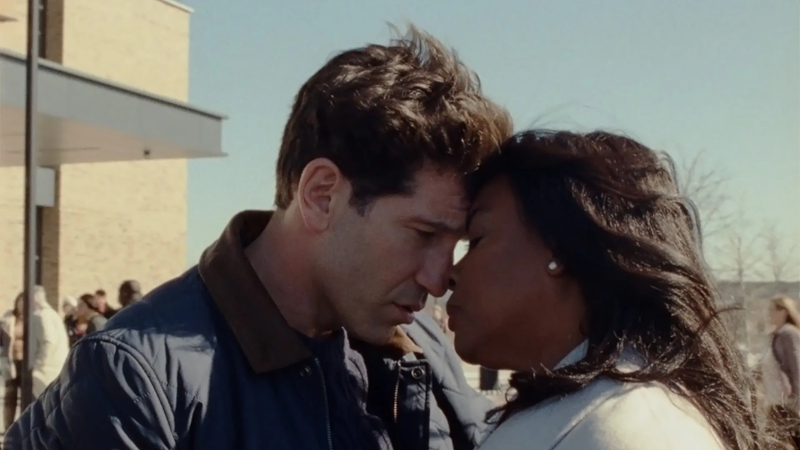Director – Ava DuVernay – 2023 – US – Cert. 12a – 135m
***
A US journalist researches a book reinterpreting US racist attitudes to black people through both the Nazi’s segregation of Jews and the Indian caste system’s treatment of Dalits – out in UK cinemas on Friday, March 8th
This is based on both the 2020 nonfiction book Caste: The Origin of Our Discontents and its author US journalist and Pulitzer Prize-winner Isabel Wilkerson’s journey in writing that book. Highly effective in putting the first of those elements on the screen, the screenplay, credited to both DuVernay and Wilkerson, proves much more uneven in its attempts to do so with the second.
Wilkerson’s thesis looks at the US’ historic racist treatment of black people through the lens of a caste system. The term caste system derives from the Western European analysis of Indian society, and to a lesser extent other South Asian societies, in which certain designated groups are elevated above others to produce and maintain a social hierarchy. As portrayed here in the film, the book looks firstly at the US in these terms – a caste system favouring white people over blacks – then Nazi Germany – a caste system favouring Germans over Jews, a radical use of caste as an historical analytical tool I have never come across before – and finally India – a caste system putting the Dalits, the untouchables who traditionally clean latrines, at the bottom of the pile below everyone else.
Before the film gets on to India, it’s pretty convincing in its arguments about the Nazis’ segregationist attitudes to Jews deriving from the US’ attitudes to protect superior white people from inferior blacks, going so far as to show a meeting of Nazi officials discussing the effectiveness of the US’ Jim Crow laws and how they could be adapted to similarly segregate the Jews. All of this would fit neatly into a documentary format, but DuVernay, whose earlier works include the impressive drama Selma (2014) about Martin Luther King and the civil rights marches in Alabama, is more of a drama person than a documentary person.

DuVernay puts that sensibility to good use in places. She shows us a black US married couple who are sociologists, Allison and Elizabeth Davis (Isha Carlos Blaaker and Jasmine Cephas Jones) visiting Berlin for research purposes, being taken by banned author Erich Kästner (Franz Hartwig) to a Nazi book-burning rally to show them what is happening and to advise them to get out while they can. Then she tells us the story of Nazi party member August Landmesser (Finn Wittrock) who falls in love with Irma Eckler (Victoria Pedretti), a Jew, which romance undermines the official Nazi doctrine of the superiority of the Germans over the Jews. They are later caught attempting to flee the country, and both Irma and the couple’s daughter (Abigail London) are captured and sent to the death camps. In terms of Wilkerson’s thesis, August has committed the Nazi sin of marrying a member of the forbidden, lower caste.
Apparently, there’s not that much material in the book about August beyond an incident when, in a crowd of fellow workers, he refused to deploy the Nazi ‘Heil Hitler’ salute. But DuVerney and Wilkerson’s further research have expanded the story quite considerably.
They also follow the Davises who, in collaboration with white fellow married sociologists Burleigh and Mary Gardner (Matthew Zuk and Hannah Pneiwski), undertake a study of racist attitudes in the American South, later published as Deep South. To accomplish this, both couples live undercover as part of their respective ethnic communities, the Davises having to treat white people with deference and unable to publicly acknowledge while they are there the fact that they are working alongside the Gardners, who are also working secretly.
Quite late in the running length, the film also outlines the treatments of the Dalits in India under the caste system, showing them ritually immersed in pits of brown human excrement as an introduction to their working life. Much is made too of a Dalit child who must endure not being allowed to sit at a desk in the classroom like his fellow pupils but separate, on the floor, who nevertheless grows up to become respected academic and activist Dr. Bhimrao Ambedkar (Gaurav J. Pathania PhD) who successfully campaigns for the rights of the Dalit people in India.
So far, all of this is impressive. Wilkerson’s thesis might arguably have been better served by a documentary format, but the dramatic elements help bring the ideas to life and as a narrative feature it will probably be seen by more people than a straight documentary would as it has a certain mass appeal. No quibbles with any of that.

DuVernay wants to expand the movie further, though, making it into the story of how Wilkerson (Aunjaune Ellis-Taylor) wrote the book. In print, the author uses stories from her own and relatives lives to further explore many of the issues she is discussing in order to bring them home to people in a tangible way. Thus, we are introduced to her across the colour bar relationship with and subsequent marriage to the white Brett Hamilton (Jon Bernthal) who in flashback is shown on their first meeting as sticking up for her against a white racist pest control man (Bryan Terry Snell) attempting to palm her off with an incomplete job of work. The scenes of Wilkerson meeting with publishing colleagues (Connie Neilsen and Vera Farmiga) and even the incident which ultimately sparks the book – an editor trying to get her to return to feature writing by emailing her recordings of the killer of a ‘suspicious’ black youth Trayvon Martin (Myles Frost) he subsequently shoots dead taking the law into his own hands are effective.
However, Duvernay undermines all this when she comes to deal with the various personal bereavements that befall Wilkerson, of her husband and various close, much-loved relatives, allowing these episodes to descend into lengthy montages with music attempting to tug at the heartstrings and bring out the audience handkerchiefs en masse, pushing the proceedings into gratuitous audience manipulation which is the last thing the film needs. It’s a cringe-worthy self-sabotaging of what would otherwise be a truly remarkable and excellent piece of work.
Origin is out in cinemas in the UK on Friday, March 8th.
Trailer:
